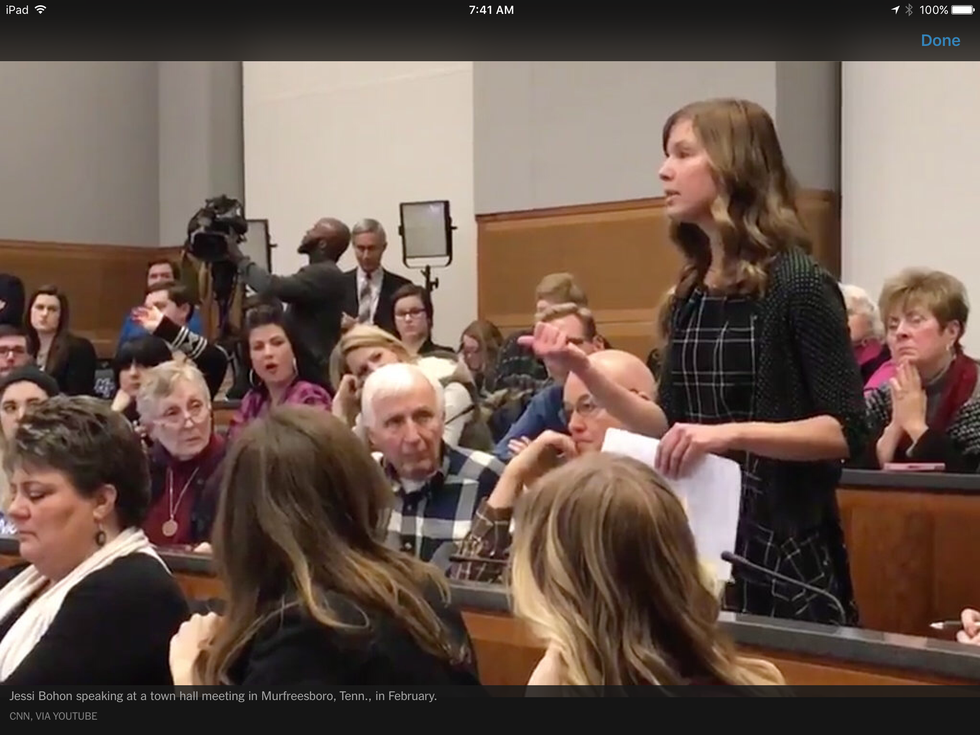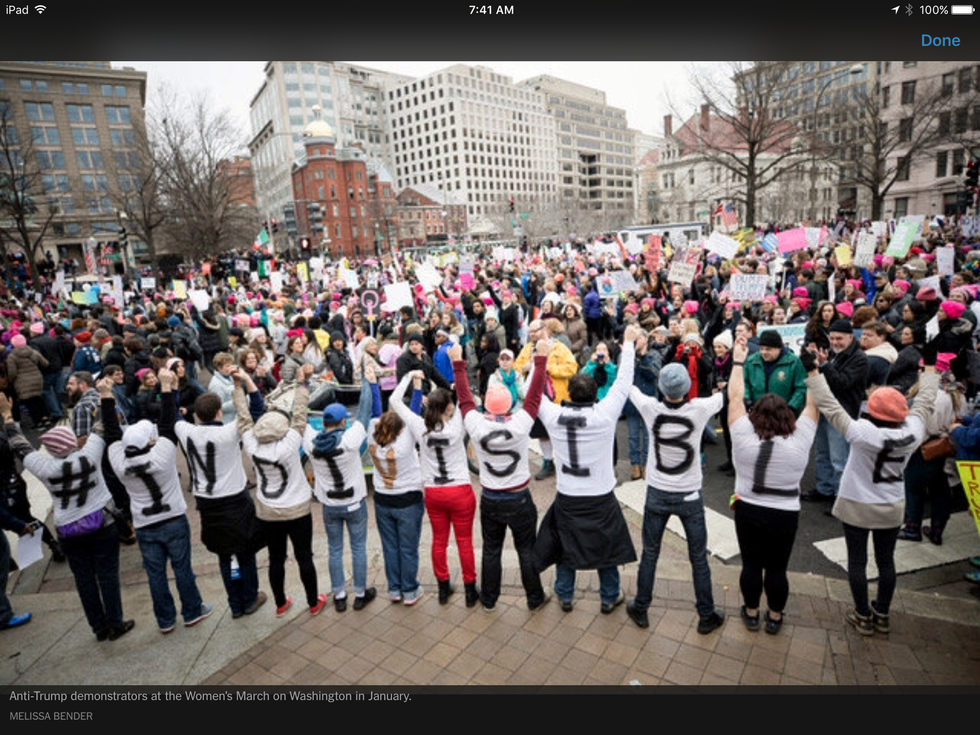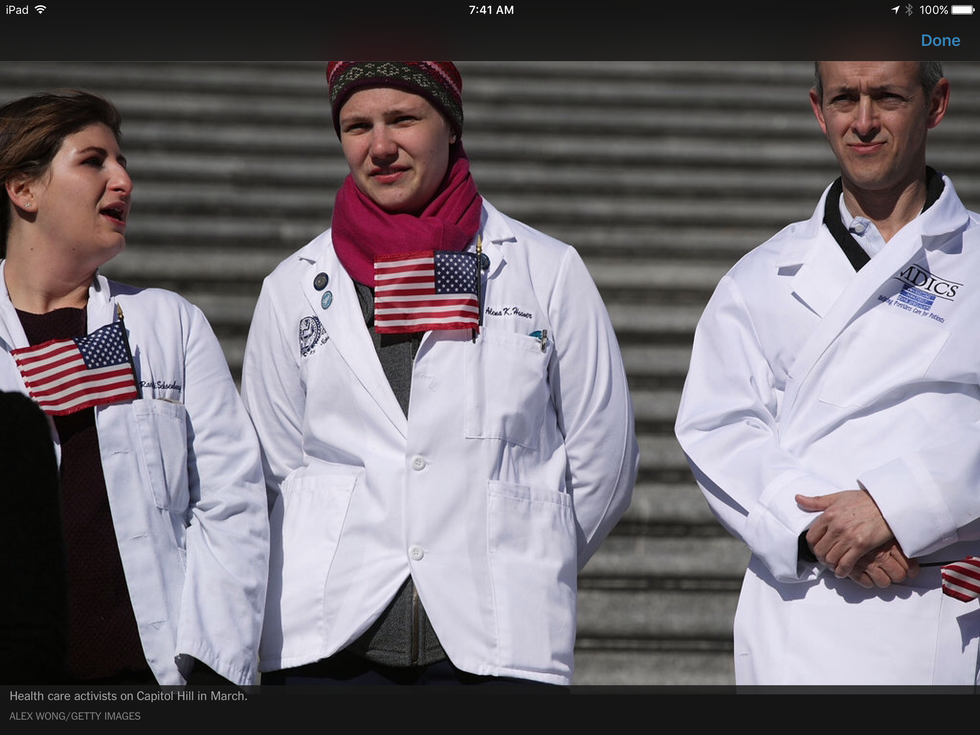Many Americans look back on the heroic political fights of the past — for suffrage, Social Security, civil rights, Medicare — and wonder why today's politics never produce inspiring victories. Well, we just witnessed one.
If one of the Senate or House health care bills had become law, millions of people would have lost their coverage. Ultimately, many would have been denied medical care. Birth defects, cancer, diabetes and other conditions would have gone untreated.
And it came depressingly close to happening. But it didn't — because of a lot of hard work from a lot of people. Today, I want to give them their due. They are the people who have helped save decent medical care for their fellow citizens. They are an antidote to cynicism in this often cynical time.
The Citizens
Jessi Bohon isn't a political activist. She is a teacher in central Tennessee who grew up poor in rural Virginia. But President Trump's victory led her to join a grass-roots group called Indivisible, which encouraged people to attend town hall meetings on health care.
On Feb. 9, Bohon went to one in Murfreesboro, Tenn. There, she asked her House representative, Diane Black, to fix Obamacare's problems instead of taking away insurance. "As a Christian, my whole philosophy in life is pull up the unfortunate," Bohon told Black. "We are effectively punishing our sickest people." The remarks went viral.
Bohon was one of thousands of citizens who took time to attend meetings, visit congressional offices and call those offices, often repeatedly. This sustained action worked better than any poll to show Congress how unpopular the bills were. It was a reminder of how democracy can work.
The Organizers
Jessi Bohon was able to join Indivisible because of a group of millennials who reacted to Trump's election not with despair or blame games but by trying to make a difference.
At an Austin, Tex., bar during Thanksgiving week, three friends got together to talk about stopping Trump's agenda. The friends — Sara Clough along with Leah Greenberg and Ezra Levin, a married couple who had both worked in Congress — envisioned a Google document with tips for citizen action. Others were involved, too, and the document began circulating online. It led to the formation of Indivisible, with chapters around the country trying to replicate the Tea Party's success, albeit to different ends.
The various groups and organizers fed off one another. Health care wonks like Andy Slavitt (who had run Medicare and Medicaid) and Topher Spiro used Twitter to explain what Congress was doing — and urge action. The hosts of a hit podcast, Pod Save America, implored their audience to stay engaged. AARP ran ads and mobilized members. It was a vast health care conspiracy.
The Experts
I've never seen a major political fight inspire such an expert consensus, across the ideological spectrum.
Groups representing doctors, nurses, hospitals and patients of virtually every disease criticized these bills. So did both liberal and conservative policy experts. Congressional Budget Office analysts refused to be bullied and provided dispassionate, and devastating, analyses.
The bills had virtually no independent defenders. This intellectual honesty — the avoidance of false balance — helped the public understand that this wasn't a classic partisan fight with each side making some good points. It was a case of cynical politicians willing to hurt their constituents in order to keep a misguided campaign promise.
The Unintimidated
At least nine Republican senators expressed grave doubts about the bills. But only two voted no consistently: Susan Collins of Maine and Lisa Murkowski of Alaska.
They were clearly affected by the outpouring of public opinion. Murkowski has cited a constituent who said she would not be alive without Obamacare. Collins, marching in a Fourth of July parade in a remote part of Maine, heard shouts of "Stay strong, Susan!"
But many senators ignored such voices. What set Collins and Murkowski apart was a willingness to buck intense pressure from Republican leaders. "Boy, are you tough," Vice President Mike Pence ruefully said to Collins before the final vote. Senator Chris Murphy, a Connecticut Democrat, told me that he thought the two senators' history of partisan independence was crucial: "Susan and Lisa knew you could stand up to the Republican leadership and survive."
The Institutionalists
Chief Justice John Roberts is a movement conservative. Yet he cast the vote that saved Obamacare in 2012 partly because he understood that a partisan shredding of the safety net could undermine his institution — the Supreme Court.
John McCain is also deeply conservative. Yet, like Roberts, he realized that taking health coverage from millions, in a hasty, secretive process, could damage his favorite institution — the Senate.
When his colleagues didn't heed his warning to abandon that approach, McCain flipped his vote. "No," he announced at 1:30 a.m. on Friday, shocking Democrats who had given up on him and Republicans who had assumed he wouldn't really break ranks on principle.
The Democrats
I know it's unfashionable to praise a political party, and I have plenty of complaints about the Democrats. But the fact is, many Americans would soon lack health insurance were it not for the unity of elected Democrats.
Not a single one wavered in recent months. On the left, Bernie Sanders, who's technically an independent, worked to poke procedural holes in the bills. Every red-state Democrat stood firm, too. Why? They thought their Senate leader, Chuck Schumer, was listening to them and their concerns. They had also held their own town halls, and they knew the bills were deeply unpopular.
The unity was a fitting echo of 2010, when Barack Obama, Joe Biden, Nancy Pelosi and Harry Reid kept their party together to pass the most important social policy in decades. Today, it remains the law of the land.
No one should think the fight is over. Murphy, the Connecticut senator, says he wakes up every day fearful of a new repeal effort. Even without one, Obamacare needs to be improved, and defended from Trump's sabotage. There's much more work to do.
But I hope everyone who played a role in last week's victory sets aside some time to savor it. It was a big deal, and it was not inevitable. One day, Americans will look back on it with respect and, yes, nostalgia.
This article appeared in The New York Times today.
###
August 1, 2017
Addendum. Put your own name on the list. Remember all your calls! Be proud and get ready if you have to act again!





